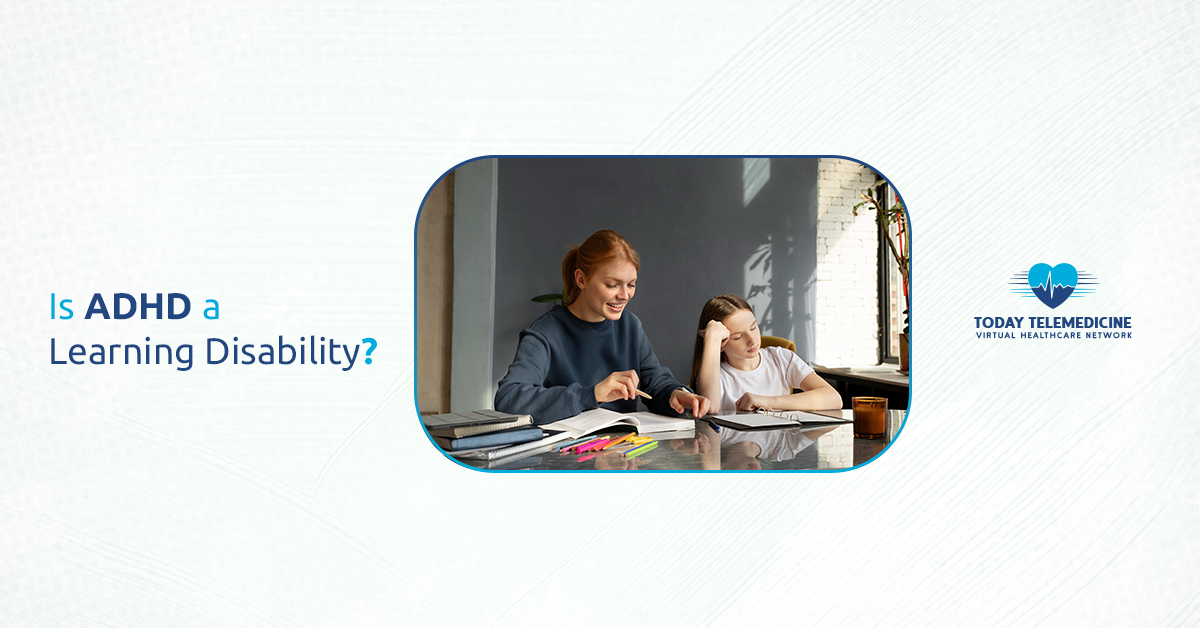Attention Deficit Disorder (ADD) is a disorder that affects many individuals in America. It’s a commonly accepted truth.
ADHD often brings arguments when people discuss how it influences learning.
A common question is, “Is ADHD a learning disability?”
To reply to this query, we will first explain ADHD. Then, we’ll discuss its effects on learning and how it differs from other learning disabilities. Finally, we’ll talk about its management.
Today Telemedicine offers expert ADHD care and treatment. Dr. Sarah Purdy, a Florida psychiatrist, helps with ADHD medication, improving symptoms and providing mental clarity. For more details, feel free to reach out.
What Is ADHD?
ADHD, a brain-based disorder, can make it tough to pay attention, manage impulses, and stay active at a reasonable level. People often spot this issue in kids, but it can stick around as they grow up. It can mess with schoolwork, jobs, and even making friends. Three main signs help identify ADHD:
- Inattention: Obstacle to focusing on jobs, listening to orders, and remaining organized.
- Hyperactivity: Excessive fidgeting, restlessness, or an inability to stay put or mute in calm locales.
- Impulsivity: Impulsive actions, interrupting, and trouble waiting for turns.
ADHD does affect learning. But, it does so differently than traditional learning disabilities.
Is ADHD a Cognitive Disorder?
ADHD affects planning, focus, and self-control. It doesn’t impair memory or perception. Unlike cognitive disorders, ADHD leads to behavioral issues.
While it impacts thinking, the main concern is behavior. This sets ADHD apart from cognitive impairments. It shows how ADHD uniquely affects daily life and decisions.
So, is ADHD a cognitive disorder? Not exactly. However, it does influence the thinking processes needed for learning.
Is ADHD a Learning Disability?
ADHD troubles focus order and impulse control in people. However, it is not a learning deficiency, but a special problem. They harm skills like reading, writing, or math. ADHD mostly affects how people think and act, not specific school skills. However, ADHD can still have an indirect effect on learning, causing trouble in class.
ADHD often gets confused with learning disabilities. It affects school performance. ADHD impacts focus and the ability to control sudden urges. Conditions such as dyslexia and dyscalculia, typically harm skills needed for schooling.
Understanding this distinction holds vital importance for accurate assessment and effective treatment. It’s essential to recognize that ADHD is not a disability in the traditional sense.
Learning Difference vs. Disability
ADHD is not the same as learning disabilities, like dyslexia or dysgraphia. Those affect specific academic skills. Instead, ADHD affects behavior and concentration. This distinction is crucial.
ADHD can challenge education by changing concentration and habits. It’s more accurate to view ADHD as a learning difference rather than a disability.
This way of thinking improves support and sets realistic expectations in education settings, especially in cases involving ADHD and learning difficulties.
ADHD and Special Education Needs
ADHD introduces learning obstacles, leading to the question, is ADHD a special need? In the United States, children with ADHD have access to special education services under Section 504 or the Individuals with Disabilities Education Act (IDEA).
However, to qualify, ADHD must notably hinder learning in regular classes. Students with ADHD might get accommodations to help their learning in mainstream classrooms, such as extra test time or adjusted assignments.
How Does ADHD Affect Learning?
ADHD affects learning in various ways, depending on symptom severity. Students with ADHD might struggle to stay still, follow instructions, or finish tasks. It can impact their academic success.
So, how does ADHD affect learning? Here are some examples:
Difficulty Focusing
ADHD affects focus in both kids and adults, making it hard to pay attention. This often leads to learning gaps and missed details. Concentration-heavy tasks become difficult, impacting daily life and education. These challenges shape the experiences of people with ADHD, regardless of age.
Trouble with Organization
ADHD causes disorganized thinking, making schoolwork hard. Students struggle to prioritize tasks and study for exams. Scattered thoughts disrupt their focus and planning.
Impulsivity
ADHD’s impulsivity can disrupt learning. Students might blurt out answers or interrupt. Such actions can cause mistakes and disturbances, affecting everyone’s education.
Does ADHD Affect Speech?
While ADHD isn’t a speech disorder, it can impact communication. People with ADHD may speak rapidly, interrupt others, or switch topics frequently, which can make expressing thoughts clearly a challenge.
These tendencies stem from ADHD’s core symptoms, rather than a speech problem, and may make communication more challenging in both personal and academic settings.
How to Overcome Learning Disabilities and ADHD in Adults?
ADHD and learning difficulties may persist from youth to maturity. They can affect work and relationships. Adults might struggle to stay organized, meet deadlines, and remember things.
These challenges can stop them from learning new skills and growing. However, with the right help and strategies, they can still do well. However, several strategies can help:
- Time Control Methods: Planners or applications can help people manage their time.
- Team Support: Dividing tasks into smaller, doable phases can minimize anxiety.
- Cognitive Behavioral Therapy (CBT): CBT reduces impulsiveness and improves focus using specific techniques.
- Medication and Lifestyle Changes: Some people benefit from ADHD meds and lifestyle changes, like exercise. They can improve focus and reduce symptoms.
These plans can benefit adults facing ADHD. They can overcome learning issues and succeed in school or work.
Final Thoughts: Is ADHD a Learning Disability?
ADHD isn’t a typical learning disorder. But, it can affect learning. It’s a mental illness that affects attention, control of impulse, and consistency. This can adversely affect academic achievement.
It’s crucial to distinguish ADHD from learning disabilities. The latter needs special help.
With the appropriate assistance, individuals with ADHD can excel at school and employment. They can utilize their individualized learning methods.
So, is ADHD considered a learning disability? Technically, no. ADHD is difficult to learn about but isn’t considered a learning disorder.
It offers unique challenges in terms of cognitive and behavioral science. These can be controlled with the appropriate strategies, accommodations, and support.
FAQs
Q: Is ADHD a learning disorder?
ADHD isn’t a learning difficulty. Yet, it can result in notice, impulsiveness, and nervous energy. It can make learning more difficult.
Q: Is ADHD a developmental delay?
ADHD is a delay in self-regulation, which affects a person’s self-control, planning, and focus. However, it does not affect physical and intellectual growth.
Q: Is ADHD an intellectual disability?
No, it isn’t. ADHD is a brain development condition. It affects attention, impulses, and executive skills. But it doesn’t lower intelligence. The disorder focuses on behavior regulation. People with ADHD have unique thinking patterns. Yet, they are just as capable.





